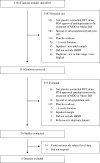Antidepressant drug effects and depression severity: a patient-level meta-analysis
- PMID: 20051569
- PMCID: PMC3712503
- DOI: 10.1001/jama.2009.1943
Antidepressant drug effects and depression severity: a patient-level meta-analysis
Abstract
Context: Antidepressant medications represent the best established treatment for major depressive disorder, but there is little evidence that they have a specific pharmacological effect relative to pill placebo for patients with less severe depression.
Objective: To estimate the relative benefit of medication vs placebo across a wide range of initial symptom severity in patients diagnosed with depression.
Data sources: PubMed, PsycINFO, and the Cochrane Library databases were searched from January 1980 through March 2009, along with references from meta-analyses and reviews.
Study selection: Randomized placebo-controlled trials of antidepressants approved by the Food and Drug Administration in the treatment of major or minor depressive disorder were selected. Studies were included if their authors provided the requisite original data, they comprised adult outpatients, they included a medication vs placebo comparison for at least 6 weeks, they did not exclude patients on the basis of a placebo washout period, and they used the Hamilton Depression Rating Scale (HDRS). Data from 6 studies (718 patients) were included.
Data extraction: Individual patient-level data were obtained from study authors.
Results: Medication vs placebo differences varied substantially as a function of baseline severity. Among patients with HDRS scores below 23, Cohen d effect sizes for the difference between medication and placebo were estimated to be less than 0.20 (a standard definition of a small effect). Estimates of the magnitude of the superiority of medication over placebo increased with increases in baseline depression severity and crossed the threshold defined by the National Institute for Clinical Excellence for a clinically significant difference at a baseline HDRS score of 25.
Conclusions: The magnitude of benefit of antidepressant medication compared with placebo increases with severity of depression symptoms and may be minimal or nonexistent, on average, in patients with mild or moderate symptoms. For patients with very severe depression, the benefit of medications over placebo is substantial.
Conflict of interest statement
No other authors have any relevant conflicts of interest to declare.
Figures


Comment in
-
Depression severity and effect of antidepressant medications.JAMA. 2010 Apr 28;303(16):1596-7; author reply 1599. doi: 10.1001/jama.2010.505. JAMA. 2010. PMID: 20424242 No abstract available.
-
Depression severity and effect of antidepressant medications.JAMA. 2010 Apr 28;303(16):1596; author reply 1599. doi: 10.1001/jama.2010.504. JAMA. 2010. PMID: 20424243 No abstract available.
-
Depression severity and effect of antidepressant medications.JAMA. 2010 Apr 28;303(16):1597-8; author reply 1599. doi: 10.1001/jama.2010.507. JAMA. 2010. PMID: 20424244 No abstract available.
-
Depression severity and effect of antidepressant medications.JAMA. 2010 Apr 28;303(16):1597; author reply 1599. doi: 10.1001/jama.2010.506. JAMA. 2010. PMID: 20424245 No abstract available.
-
Depression severity and effect of antidepressant medications.JAMA. 2010 Apr 28;303(16):1598; author reply 1599. doi: 10.1001/jama.2010.509. JAMA. 2010. PMID: 20424246 No abstract available.
-
Depression severity and effect of antidepressant medications.JAMA. 2010 Apr 28;303(16):1598; author reply 1599. doi: 10.1001/jama.2010.508. JAMA. 2010. PMID: 20424247 No abstract available.
-
[Efficiency of antidepressant therapy for patients with less severe depression].Internist (Berl). 2010 Nov;51(11):1456-8. doi: 10.1007/s00108-010-2747-6. Internist (Berl). 2010. PMID: 20941471 German. No abstract available.
-
Review: benefits of antidepressants over placebo limited except in very severe depression.Evid Based Ment Health. 2010 May;13(2):49. doi: 10.1136/ebmh.13.2.49. Evid Based Ment Health. 2010. PMID: 21856612 No abstract available.
References
-
- Hollon SD, Thase ME, Markowitz JC. Treatment and prevention of depression. Psychological Science in the Public Interest. 2002;3(2):39–77. - PubMed
-
- Mulrow CD, Williams JW, Jr, Trivedi M, et al. AHCPR Publication No 99-E014. Rockville, MD: U.S. Department of Health and Human Services, Public Health Service, Agency for Health Care Policy and Research; 1999. Treatment of depression: Newer pharmacotherapies.
-
- Depression Guideline Panel. Clinical Practice Guideline No. 5. AHCPR Publication No. 93-0551. Rockville, MD: U.S. Department of Health and Human Services, Public Health Service, Agency for Health Care Policy and Research; 1993. Depression in primary care: Vol. 2. Treatment of major depression.
-
- Khan A, Leventhal RM, Khan SR, Brown WA. Severity of depression and response to antidepressants and placebo: An analysis of the Food and Drug Administration database. J Clin Psychopharmacol. 2002;22(1):40–45. - PubMed
Publication types
MeSH terms
Substances
Grants and funding
LinkOut - more resources
Full Text Sources
Other Literature Sources
Medical

